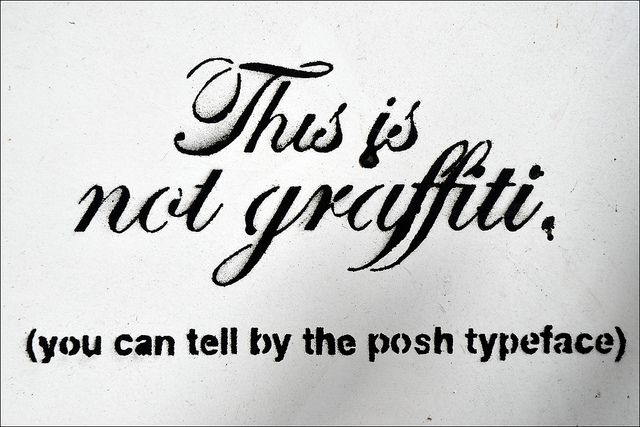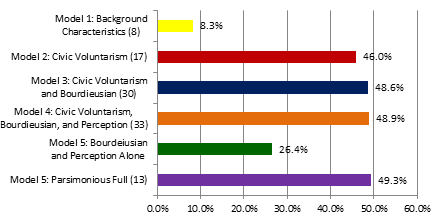There may be room for privilege, and perception of it, in explaining political activity
Why do some people get involved in politics, when others don’t? Analysing data using the ‘Civic Voluntarism Model’, which he shows is a accounting for political participation, Joe Greenwood of the University of Essex argues that privilege could be a significant factor in deciding who does and doesn’t opt to get involved.

Credit: George Rex, CC BY ND 2.0
The question of why people do or don’t get involved in politics remains central to the study of political behaviour. With a long-term downward trend in turnout there is both political and academic interest in why many citizens aren’t taking part in politics. Political activity, of course, extends well beyond voting to everything from signing a petition to joining a protest. Trends in activities may be different to the decline in turnout but the question remains: why do some people but not others get involved?
One of the classic explanations comes in the form of Sidney Verba, Kay Lehman Schlozman, and Henry Brady’s Civic Voluntarism Model. They sought to explain why levels of involvement vary across groups differentiated by background characteristics such as sex, ethnicity, and socio-economic status. Through analysis of an original survey conducted in the United States they identified three key factors that affected levels of political involvement: resources, engagement, and recruitment. The first of those encompasses things like money, time, and the civic skills that you use in day-to-day life (for instance giving presentations at work). The second factor includes interest in politics, knowledge about it, belief in one’s own efficacy and that of the system, and identification with a political party. Finally, recruitment is based on the number of requests that people receive to participate in political activity.
Crucially, they found that resources, engagement, and recruitment are distributed unevenly across different groups, which helps explain why they also have different levels of political activity. This was an interesting and important finding but there is more to be said on the matter, especially when the concept of privilege is so salient in the British context. The suggestion is that the uneven distribution of things that enable political participation is rooted in the process of socialisation. This means that what Pierre Bourdieu referred to as the forms of capital are, at least to an extent, passed from one generation to the next. He identified three forms of capital with the first being economic, for instance in the form of income and material wealth. The second is the cultural form, which encompasses tastes, preferences, and activities in the cultural sphere as well as formal education. Finally, the third form is social capital, which relates to the number, range, and status of social acquaintances, and the strengths of those relationships.
We can take the forms of capital are indicators of privilege; simply put, higher levels of economic, cultural, and social capital can be considered to indicate higher privilege. Additionally, the resources, engagement, and recruitment identified by Verba, Schlozman, and Brady can be seen to align with economic, cultural, and social capital. If Bourdieu’s theory can encompass the Civic Voluntarism Model and, at the same time, gives a measure of privilege then it is worth testing it in the context of the UK.
Crucially, it is also worth moving beyond those structural theories and looking at people’s perceptions. Perhaps the belief that ‘we’ (the public) are less privileged than ‘them’ (politicians or those involved in politics) creates an additional barrier to involvement that isn’t perfectly aligned with actual levels of privilege. If the barriers to political participation are perceptual as well as structural then the implications for creating a more inclusive political context are quite different.
To look into the above ideas, a two-wave survey of 1,501 members of YouGov’s online panel of respondents was conducted in mid-March and early April 2014. A rough-and-ready analysis of the survey data allows us to see which parts of the Civic Voluntarism Model, Bourdieus’ forms of capital (representing the broader concept of privilege), and perception of privilege are important in influencing levels of political activity. Using simple multiple regression we can add each of the concepts that we’re interested in and see how much of the variance in political activity that they account for. Political activity is measured very roughly with a summary of the frequency (from ‘never’ to ‘once a month or more often’) of eleven different types of activity undertaken by respondents.
Starting with background variables such ethnicity, sex, and job status, as well as sexuality, religion, disability, and health conditions, we can only account for around 8% of the variance in political activity. By adding the elements of the Civic Voluntarism Model we can massively improve the picture, accounting for around 46% of the variance in political activity, so it appears that Verba, Schlozman, and Brady were on to something. The strength of the Civic Voluntarism Model is maintained when we add Bourdieus’ forms of capital, which only raises the amount of variance in political activity that we can account for to 48.6%. Similarly, adding the indicators of perception of privilege only raises the figure to 48.9%. The number of variables that we’re using to explain political activity is now very large so we can take out the ones that don’t seem to be playing a part,. The results of this streamlined model, which accounts for just as much of the variance in political activity, are presented alongside the other results in the below chart.
Figure: Percentage of variance in political activity accounted for
The above chart also includes the results when we compare the established Civic Voluntarism Model to the new model consisting of the Bourdieus’ forms of capital and perception of privilege. It can be seen that the former performs much better than the latter, accounting for around 20% more of the variance in political activity. However, the streamlined model is the strongest if we take the number of variables into account (i.e. it does the most with the least variables). Crucially, this model contains elements from all of the components that have been discussed above.
From the Civic Voluntarism Model the active variables are those relating to civic skills, political interest, and recruitment, which are all positively related to frequency of political activity. From Bourdieus’ forms of capital we find that having lots of different cultural tastes is negatively related to political activity but that being frequently culturally active is positively related. Thus, it does not appear to be interest in lots of bits of culture, but actually making efforts to actively engage with some culture, that can lead to political activity. By contrast, being acquainted with different types of people in terms of sex, ethnicity, religion, and job status, is positively related to frequency of political activity. This makes sense because knowing more groups of people is likely to raise awareness of, and perhaps concern about, more issues. Finally, from the measure of perception of privilege, we find that ranking background and structural inequality highly as reasons for status differences in society is positively related to political activity. This suggests that, at least to some extent, perceiving privilege as important in society motivates a desire to influence politics.
This is a very quick initial analysis of the survey data gathered but it shows that the Civic Voluntarism Model does a good job of accounting for political participation. This is not the whole story though and elements of privilege as measured through Bourdieus’ forms of capital do seem to impact on political activity. Further, one measure of perception of privilege also played a part in explaining political activity. These are tentative findings that require the scrutiny of more complex analyses. However, they also suggest that privilege and perception of privilege can play a part in a rounded explanation of individuals’ differing levels of political activity in the United Kingdom.
—
Note: This post represents the views of the author and not those of Democratic Audit or the LSE. Please read our comments policy before posting.
—
 Joe Greenwood is a Graduate Teaching Assistant and PhD student at the Unviersity of Essex
Joe Greenwood is a Graduate Teaching Assistant and PhD student at the Unviersity of Essex






 Democratic Audit's core funding is provided by the Joseph Rowntree Charitable Trust. Additional funding is provided by the London School of Economics.
Democratic Audit's core funding is provided by the Joseph Rowntree Charitable Trust. Additional funding is provided by the London School of Economics.
There may be room for privilege, and perception of it, in explaining political activity https://t.co/2tNTDLpS0l https://t.co/EJSBNIsNZd
There may be room for privilege, and perception of it, in explaining political activity https://t.co/vcy6nhDudk